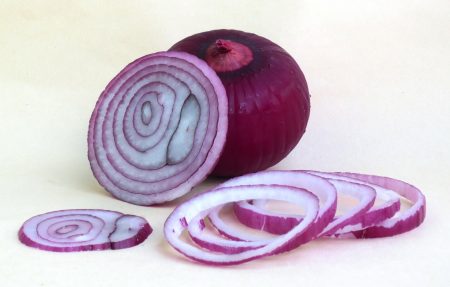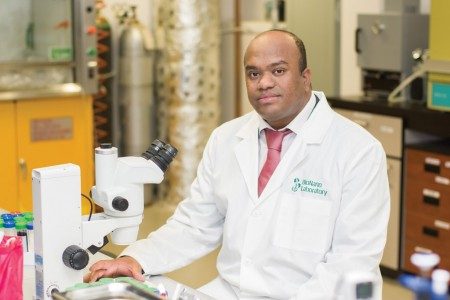
The next time you walk down the produce aisle of your grocery store, you may want to reach for red onions if you are looking to fight off cancer.
In the first study to examine how effective Ontario-grown onions are at killing cancer cells, U of G researchers have found that not all onions are created equal.
Engineering professor Suresh Neethirajan and PhD student Abdulmonem Murayyan tested five onion types grown in Ontario and discovered the Ruby Ring onion variety came out on top.
Onions as a superfood are still not well known. But they contain one of the highest concentrations of quercetin, a type of flavonoid, and Ontario onions boast particularly high levels of the compound compared to onions grown elsewhere in the world.
The Guelph study revealed that the red onion also contains high amounts of anthocyanin, which enriches the scavenging properties of quercetin molecules, said Murayyan, the study’s lead author.
“Anthocyanin is instrumental in providing colour to fruits and vegetables, so it makes sense that the red onions, which are darkest in colour, would have the most cancer-fighting power.”
Published recently in Food Research International, the study involved placing colon cancer cells in direct contact with quercetin extracted from the five onion varieties.
“We found onions are excellent at killing cancer cells,” said Murayyan. “Onions activate pathways that encourage cancer cells to undergo cell death. They promote an unfavourable environment for cancer cells and they disrupt communication between cancer cells, which inhibits growth.”

The researchers have also recently determined onions are effective at killing breast cancer cells.
“The next step will be to test the vegetable’s cancer-fighting powers in human trials,” said Murayyan.
These findings follow a recent study by the researchers on a new extraction technique that eliminates the use of chemicals, making the quercetin found in onions more suitable for consumption.
Other extraction methods use solvents that can leave a toxic residue which is then ingested in food, said Neethirajan.
“This new method that we tested to be effective only uses super-heated water in a pressurized container,” he said. “Developing a chemical-free extraction method is important because it means we can use onion’s cancer-fighting properties in nutraceuticals and in pill form.”
While consumers may already add this superfood to their salads and burgers as a preventive measure, the researchers expect onion extract will eventually be added to food products such as juice or baked goods and be sold in pill form as a type of natural cancer treatment.
Contact:
Prof. Suresh Neethirajan
sneethir@uoguelph.ca